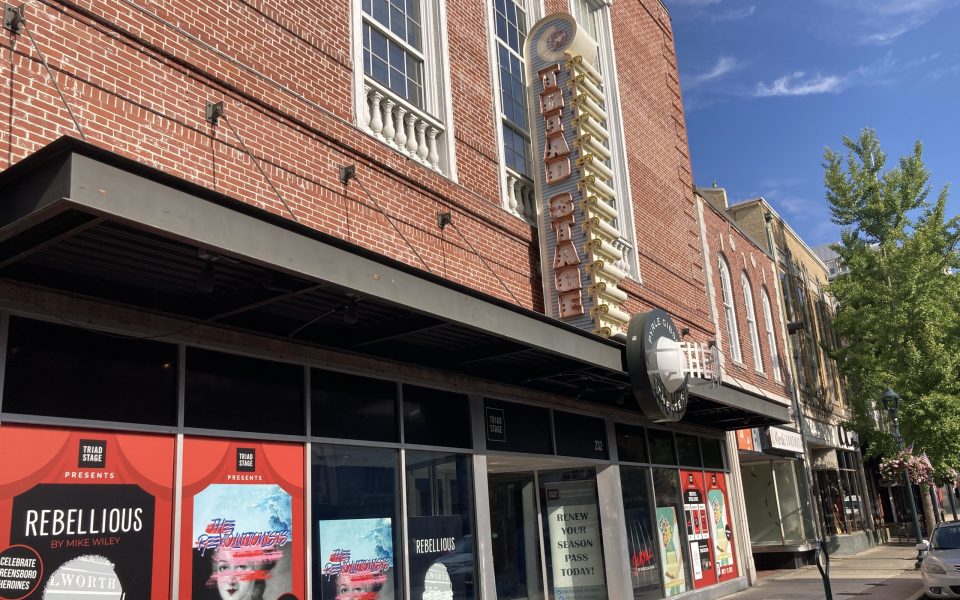On April 6, Triad Stage, the Greensboro-based theater company of more than 20 years, announced in a press release that they would be halting operations for the time being and canceling their upcoming production of The Cake.
“Triad Stage regrets to announce the cancellation of its upcoming production of ‘The Cake’ due to financial constraints,” the release read. “Additionally, the theater will be pausing ticket sales and subscriptions, as well as other non-essential operations, while we examine all options available to our organization at this time. Ticketing operations for the Eastern Music Festival are not affected.
We understand that this news is disappointing to our patrons and supporters, to the artists and artisans whose work we are privileged to showcase, to our creative and dedicated staff, and to all others who contributed time, talent, and resources in support of our reopening. We appreciate your commitment, and we ask for your continued patience as we complete development of the best possible plan for the theater going forward. We look forward to sharing that plan, which will include specific communication with ticket holders regarding their tickets to ‘The Cake’ and season ticket renewals, and to playing a continuing role in support of Greensboro’s thriving arts community.”
In an interview with Triad City Beat, Executive Director Kate Holland said that there wasn’t just one thing that contributed to the lack of finances.
“Certainly resulting from the pandemic, certainly resulting from the shutdowns from pandemic, but also losing the founders over the last few years really affected how people felt about donating to us,” Holland said.
Triad Stage was founded in 2002 by Richard Whittington and Preston Lane. In 2020, TCB‘s Jordan Green broke a story that delved into sexual assault allegations against Lane, who was artistic director at Triad Stage at the time. Lane ultimately ended up resigning from the organization. Then, three full-time employees were laid off. Shortly afterwards, the board closed the organization completely.

When asked if she thought the Preston Lane controversy affected Triad Stage’s viability, Holland said she couldn’t comment on the case at all.
In 2022, the arts organization reopened after spending the prior two years engaged in intensive diversity and equity training, as reported by TCB.
At the time, Artistic Director Sarah Hankins told TCB that the overall process was “exhausting” but that she was “hopeful” for the future.
Now, less than a year later, the organization is once again at a difficult crossroads.
On Wednesday, Holland said that while Triad Stage had met 159 percent of their goal for grant funding, that the organization only met 28 percent of their goal for individual donors. She also said they were able to keep their expenses down.
“We weren’t able to meet our individual donor goal,” Holland said. “The unearned individual donors weren’t helping us to meet our goals.”
Part of the reason Holland suspects, is that the artistic vision of Triad Stage shifted in the two years it was closed. After engaging in intense DEI training, the organization decided to produce more shows that were written by people of color that featured diverse casts. That means less takes on Shakespeare or traditional works.
“Triad Stage always had a very traditional, regional theater season,” Holland said. “A lot of midcentury classics, some things reimagined, Shakespeare. And we were moving, as part of our DEIA work, we were moving into a realm where we were able to tell more diverse stories. So plays written by people of color featuring performers from the region as opposed to maybe taking a Tennessee Williams piece just doing a diverse cast. There’s difference between telling a story written by a person of color versus trying to fit people of color into a story told by a white person.”
Holland also said that questions about whether or not the opening of the Tanger Center affected Triad Stage have come up but said that she thought of the two entities as separate.
“I don’t think that had a significant impact on us,” she said. “I think the Tanger Center and Triad Stage should be complementary to each other rather than competitive; I don’t feel competitive with them.”
But she did acknowledge that there was a “finite number of dollars” to go around.
As far as when or if Triad Stage will reopen, Holland said that it’s up to the board, which has been meeting every week.
“I presume we’ll hear before too long, but I don’t have a timeline,” she said.
On Wednesday afternoon, the organization sent out an email announcing a warehouse sale of the company’s props.

Holland told TCB that the warehouse sale was already scheduled for this summer.
“We were planning to clean out warehouse this summer regardless of the situation,” she said. “It’s just the timing seems to relate to the pause in operations.”
Join the First Amendment Society, a membership that goes directly to funding TCB‘s newsroom.
We believe that reporting can save the world.
The TCB First Amendment Society recognizes the vital role of a free, unfettered press with a bundling of local experiences designed to build community, and unique engagements with our newsroom that will help you understand, and shape, local journalism’s critical role in uplifting the people in our cities.
All revenue goes directly into the newsroom as reporters’ salaries and freelance commissions.


Thanks Sayaka, and TCB for giving this some ink.
Triad Stage is a vital part of our community, from both artistic and entertainment standpoints, and has a positive economic impact on our downtown as well.
Theater helps us consider who we are, and where we came from. It provokes thinking and introspection- and deepens our relationship to each other.
We all need to pay attention and support Triad Stage during this time.
[…] mid-April, Triad City Beat and other news outlets reported that the theater company, which was founded in 2002, was facing financial difficulties. At the […]